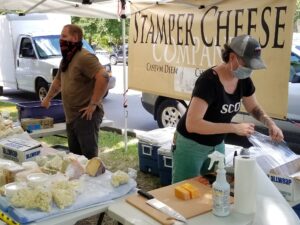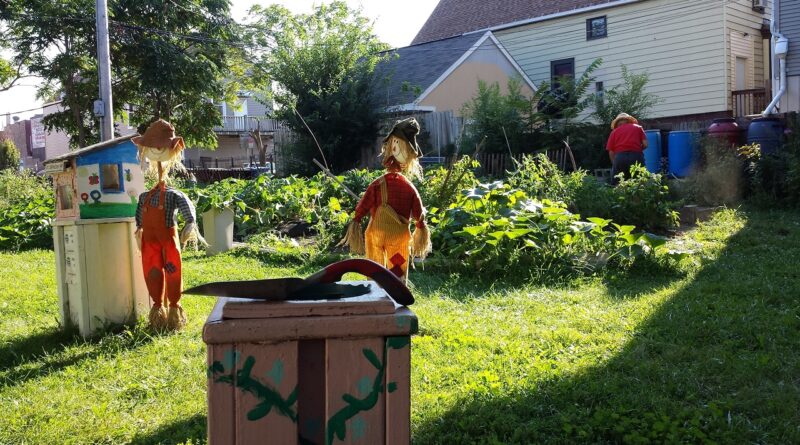Chicago’s War on Community Gardens
Podcast: Play in new window | Download (Duration: 1:35:18 — 43.5MB)
Subscribe: Apple Podcasts | Spotify | Android | iHeartRadio | Podchaser | Email | TuneIn | RSS | More
(August 2, 2020) To write “Chicago’s War on Community Gardens” might seem like hyperbole. But the City started 2020 by springing a nasty surprise on groups that grow food to benefit themselves and their communities. On February 1, the Department of Water Management (DWM) released an updated hydrant permit policy.
It was unexpected and draconian.
Skip to a specific segment in this podcast
2:30 Janie Maxwell, Jonathan Pereira, Gary Fehr
47:09 Sean Ruane, Mekazin Alexander, Gina Jamison
1:26:31 Meteorologist Rick DiMaio
According to a Change.org petition called Equitable Water Access for Chicago Food Security, the new policy
- Establishes a new rate of $117.81/year that is applicable to both farms and gardens. That rate is applicable to operations under 3,000 square feet. It is an added $50.68 for each additional 3,000 square feet
- Prohibits the use of vacuum breakers and requires the use of a Reduced Pressure Zone (RPZ) unit as a water backflow prevention device. This device must be re-certified annually.
However, the new policy does not
- Recognize that the new application process puts additional administrative and financial burdens on farms/gardens who are trying to get immediate access to water in 2020.
- Provide any support for the costs associated with RPZ acquisition, installation, and certification, or the acquisition of hydrant fittings and keys. The average cost of this is around $1800.
- Acknowledge that many gardens and farms normally use a 2″ RPZ valve to ensure adequate water pressure. The new policy only allows for the use of a ¾” RPZ valve.
In May, the Chicago Sun-Times reported on the change.
The new restrictions put in place by the Chicago Department of Water Management were created to prevent water contamination, but the prices have been crippling to gardens around the city, especially those in communities where fresh produce is already scarce.
Mekazin Alexander said in previous years it was easy to obtain the permit needed to use the city’s fire hydrant for her garden in Englewood. She would apply for the permit in person and simply pick up the key to use the nearby hydrant and a backflow device used to protect the city’s water supply.
“This year I went online to fill out the application and I was denied immediately,” Alexander said. “I was surprised, I thought I did something wrong, so I applied again — and I was denied again.”
Alexander says that installation of the RPZ valve is now required to be installed by a licensed union plumber, then inspected by the water department. She described the development as “a major shock and a hardship.”
To put it in perspective, Block Club Chicago talked to Viviana Gentry Fernández-Pellón, program director for Advocates for Urban Agriculture (AUA). In her analysis, the cost to start tapping water from a hydrant just went from $5 to at least $1,700. Oh, and did I mention that this happened just as we were entering a novel coronavirus pandemic? The same story reported this.
With so many people out of work because of coronavirus, Fernández-Pellón said the timing for the new rules couldn’t be worse. The new barriers to accessing water will have “a significant effect in the way that people are able to address their own food insecurity,” she said.
AUA says that it worked for months with the Mayor’s Office, the Department of Water Management, and other departments. That resulted in an updated policy being released in July. Among the changes,
• Community gardens no longer have to create a nonprofit.
• Bans on sale of produce are lifted.
• Urban farms can apply for less-costly permits.
• Inspections for valves reduced to once annually.
But those changes don’t solve all of the problems. In a recent post, AUA wrote,
While it’s clear that there are some very positive changes, there are still significant administrative and financial barriers preventing growers from accessing water through the hydrant permit process. We encourage you to sign on [to the aforementioned Change.org petition] in support of a more equitable water policy.
It doesn’t help that Chicago’s fire hydrants are often opened illegally to help neighborhoods “beat the heat” of summer. That creates water pressure issues for fire fighters and other problems, which makes the DWM hang on even more tightly to control of the hydrants.
AUA has put together a Chicago Growers Guide to help gardeners work through what is basically a byzantine and unworkable system that suddenly became City policy in February. On its website, AUA states that
The impact of the updated policy has been stark in Black and Brown communities, who are already experiencing higher rates of hunger and consequential health disparities. This type of health inequity caused by food insecurity exacerbates underlying chronic conditions and leads to higher rates of COVID-19. Black and Brown people are now forced to bear the weight of this expensive and cumbersome water policy.
And, working with the Chicago Region Food System Fund, AUA is helping urban farms and gardens by providing grant money for RPZ acquisition, installation, and certification, as well as the cost of purchasing hydrant caps and keys. Meanwhile, AUA continues to team with organizations like Food:Land:Opportunity (FLO) and Slow Food Chicago (SFC) to provide support for local farms and gardens. To date, 67 groups have received funding through two rounds of the COVID-19 Farmer Support Grant.
But that leaves some unanswered questions. What was behind the new City policy concerning water? The City says it is to prevent water contamination. Does that mean that previous administrations didn’t care about water contamination? Did something happen recently to raise concerns about this issue? Why weren’t Chicago’s urban farmers and gardeners and their attendant organizations consulted? (Which is, sadly, often par for the course.) Where was the transparency?
Where, for that matter, is a revived Chicago Department of the Environment, which was one of mayoral candidate Lori Lightfoot’s campaign promises?
Sean Ruane, Executive Director of Advocates for Urban Agriculture, returns to the show this morning to talk about this issue. He is joined by Mekazin Alexander, who founded and runs Earl’s Garden Mae’s Kitchen, a community garden in the Englewood neighborhood of Chicago, and Gina Jamison with Kuumba-TreAhm Community Garden in East Garfield Park.
Here are two more links that might be helpful. The first is a joint action alert from AUA and the Illinois Environmental Council (IEC). If you live in Chicago and you sign this form, it will automatically be sent to your alder and to Mayor Lori Lightfoot. Finally, here’s a comprehensive link tree from AUA, including both online petitions, as well as the Growers Guide for Water Access, and the new City hydrant policy.
Celebrating National Farmers Market Week
 Kathleen and I went to our first farmers market of the season last Sunday. It was the Logan Square Farmers Market, and it was the final week of July. It took us this long for some obvious reasons. 1) The market didn’t even open this year until June 21. 2) We’re not interested in being in crowds of any kind, due to COVID-19. For the life of me, I cannot figure out why the parking lot of the Target store in our neighborhood hasn’t seen an appreciable dip in the number of cars throughout this crisis. Just what is so important at a Target that you need to risk your health and possibly your life?
Kathleen and I went to our first farmers market of the season last Sunday. It was the Logan Square Farmers Market, and it was the final week of July. It took us this long for some obvious reasons. 1) The market didn’t even open this year until June 21. 2) We’re not interested in being in crowds of any kind, due to COVID-19. For the life of me, I cannot figure out why the parking lot of the Target store in our neighborhood hasn’t seen an appreciable dip in the number of cars throughout this crisis. Just what is so important at a Target that you need to risk your health and possibly your life?
Some of you will say, “Well, they buy groceries there.” And I can understand that. But, hey folks, did you know that there are deliveries and on site pick up services out there?
And, there are farmers markets, though many have been slow to get started. Think about it. You can shop outdoors. Everybody is wearing a mask. Very few people touch the food you buy–it basically goes from the farm to the market, with the same hands who grow the food handling it until you take it home. What’s not to like in a pandemic?
As for our experience at the LSFM, it was…okay. We pretty much got what we wanted. Everybody was wearing masks. The traffic was not one-way–the market amended that rule recently. Did I feel safe? Uh…kind of, considering that some folks walking outside of the market weren’t wearing masks. (Covidiots.) And it was 90+ degrees, so wearing a mask wasn’t fun. It never is, actually.
August 2 to 8 is National Farmers Market Week. It will be an interesting celebration, in light of this very strange year. Janie Maxwell, Executive Director of the Illinois Farmers Market Association, joins us to talk about how our state’s–and perhaps other states’–farmers markets are faring. She was with us in May, as the markets were ramping up and creating the COVID rules to keep patrons safe.
Jonathan Pereira is also with us today. He’s Executive Director of Plant Chicago. which is working to make cities healthier and more efficient by developing and sharing the most innovative methods for sustainable food production, energy conservation and material reuse. They also have a farmers market, every Saturday from 11am-3pm, in Chicago’s Back of the Yards Neighborhood. The market is in Davis Square Park (southeast corner of park @ 45th & Marshfield). He will talk about their produce box program and Link matching at the market.
Gary Fehr is co-founder and owner of Green School Farms in Nebraska. Technically, we’re not related, but he’s a part of my extended family. And I know that he’s been doing a lot of good in his neck of the prairie. This is his sixth season on his small farm near Lincoln. He still works 30 hours per week on another job, so you know he’s not a lazy person.
Gary has 20 acres devoted to hay, and he’s reestablishing a small prairie. Then there’s his edible farm, which features about 30 varieties of vegetables, which he pretty much tends by himself. He lives in Lincoln, and has to drive 30 minutes to get to his farm, which makes things even more difficult. He takes his produce to the Sunday Farmers’ Market at College View. But he also donates food to We Can Do This. We Feed The Kids At F Street Community Center Every Weekend. As you’ve probably figured out, he’s a good guy.
Janie and Jonathan and Gary will tell us how farmers markets are doing in the COVID Year.

